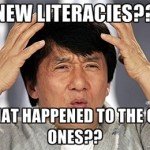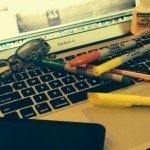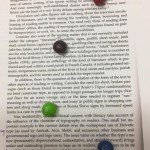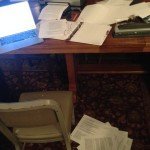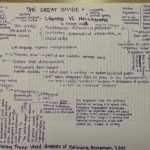Tim Wall: Curated Blog for Week 8
Literacy highlights Humanity & Research Construction (A Post-Discussion Reflection)
THE SETTING:
It’s October. The sun is setting as we file into class, deep yellows and pumpkin orange paint the sky in lazy brush strokes. We had moved classrooms and now find ourselves in a conference setting–one long table extends the length of the room, adorned with various snacks such as chips and candy. Fellow colleagues filter in and get settled around the table. It’s a few minutes past start time and we begin with a song.
The class listens attentively as Dropkick Murphys’ “Rose Tattoo” plays on the big screen. The song was my idea. I believed it did an excellent job at illustrating the relationship between global and local literacies and more so, Kirkland’s idea of outlier literacies such as tattoos.
KIRKLAND AND OUTLIER LITERACIES:
One of the main articles that we read this week was David Kirkland’s “The Skin We Ink: Tattoos, Literacy, and a New English Education.” While many of the articles we’ve deep-read this semester are more abstract in nature and conceptual, Kirkland’s piece was more grounded in reality. Essentially, it was easy to follow Kirkland’s research on Derrick Todd and the significance of finding literacy in his tattoos. This was primarily shown through the power of symbolism, to take a symbol or phrase and apply a personal meaning to it. What is ultimately most fascinating is Kirkland’s theory that certain genres of literacy highlight humanity. This is exceptionally interesting in how we can process literacies but more so, how reading and writing can contain and express deeply complex human emotions. For Kirkland’s research, he aimed to study how literacy shapes life. He goes on to write, “literacy cannot exist separate from human struggle, especially among under-sieged groups” (378).
Kirkland’s research highlights two distinct themes. First (as mentioned above), Kirkland is showing that literacy is deeply and intimately connected to humanity–specifically to the ongoing struggles of life. This can be seen clearly through his observation and research of Derrick Todd’s struggles. For Derrick, he used tattoos (symbolism and words used to express an idea) to cope with the loss and tragedy that seemingly surrounded him. In this way, tattoos give Derrick agency; they give him the power to harness his loss, trauma and memory into a personal, yet tangible piece of art that he carries with him. This is an important step in healing as the tattoos give Derick power to shift the narrative of his past into something he can control, reshape and frame in whatever way he sees fit. In Derrick’s case (and I assume a good portion of the tattoo community would agree with this), this reframing constitutes a path of healing, reconciliation and remembrance. In Kirkland’s words, “it helps to understand the complex ways in which literacy function(s) across multiple centers of life.” (378).
This is even more intriguing when we consider Brandt’s idea of the connection between global and local literacies. This can be clearly seen in tattoo culture. While tattoos are intimate and highly personalized when it comes to the meaning attached to symbolism, it also maintains a global genre of expression. In this way, we can see how Brandt’s global becomes local when personalized. To expand on this, American traditional tattoo culture is built off of various military branches and many symbols original meanings are still prevalent today. So even though the symbol and meaning now belong to the individual, they are now a part of a wide network of shared symbols, of shared messages which only speak to elevate the humanity that exists within all literacies–even ones that are outliers of the dominant cultures.
CLASS RESPONSES TO KIRKLAND (GOLDEN LINES)
The following is highlighted quotes from various peers who added thoughtful and inquisitive responses during the class discussion pertaining to Kirkland and outlier literacies.
Alo – Readers assumptions about the author’s color before looking Kirkland up. What does this say about our own preconceptions of scholarly articles? Also consider skin disorders and scars too. In regards to tattoos—they mark experience.
Kim– What I like about the piece: Field notes, interviews, Kirkland expands definitions of what counts as literacy—tattoos, graffiti—these are outlier and demonized by mainstream culture. Kirkland shows the humanity element. Tattoos as literacy show identity, voice and can heal emotional wounds and trauma.
Hayden– Taking a symbol (tattoo) and making your own embodies literacy and control. Taking power over past trauma and experiences. The different types of literacies are worthy of study. It also shows agency and identity.
Larisa– I loved that there was a black researcher on black subject—makes me think of racial profile of tattoos. Gate kept by skin color. Yakiniq–popular amongst Inuit women to distinguish various rights of passage including puberty, childbirth, marriage etc.
Brooke– Does my tattoo look hot? I still look f’n hot.
Tim– As a tattoo artist, skin texture is most important. Agency is shared between trauma, loss and experience. Even Tattooers have sponsorship. Tattoos themselves mean different things in different cultures—indigenious, prison, military, etc. —makes me think of symbols in general as a literacy.
Author Bio
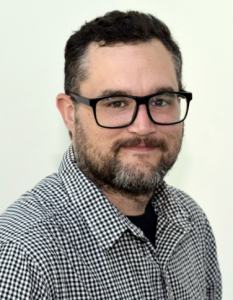 Timothy Wall / Graduate Student / CSU Chico
Timothy Wall / Graduate Student / CSU Chico
Hailing from the Heartland (Southern IL), I am finishing up my Masters in Creative Writing at CSU Chico. I am a novelist and poet with a few finished works which include Under The Street Lights – a modern day crime noir and The Drums to Which We March – a book of depressing, love-longing poetry. I am a big fan of Vonnegut, Palahniuk, King and Bukowski. Outside of writing, I love Harleys, tattoos, Joy Division and Brazilian Jiu Jitsu. I am a veteran.
